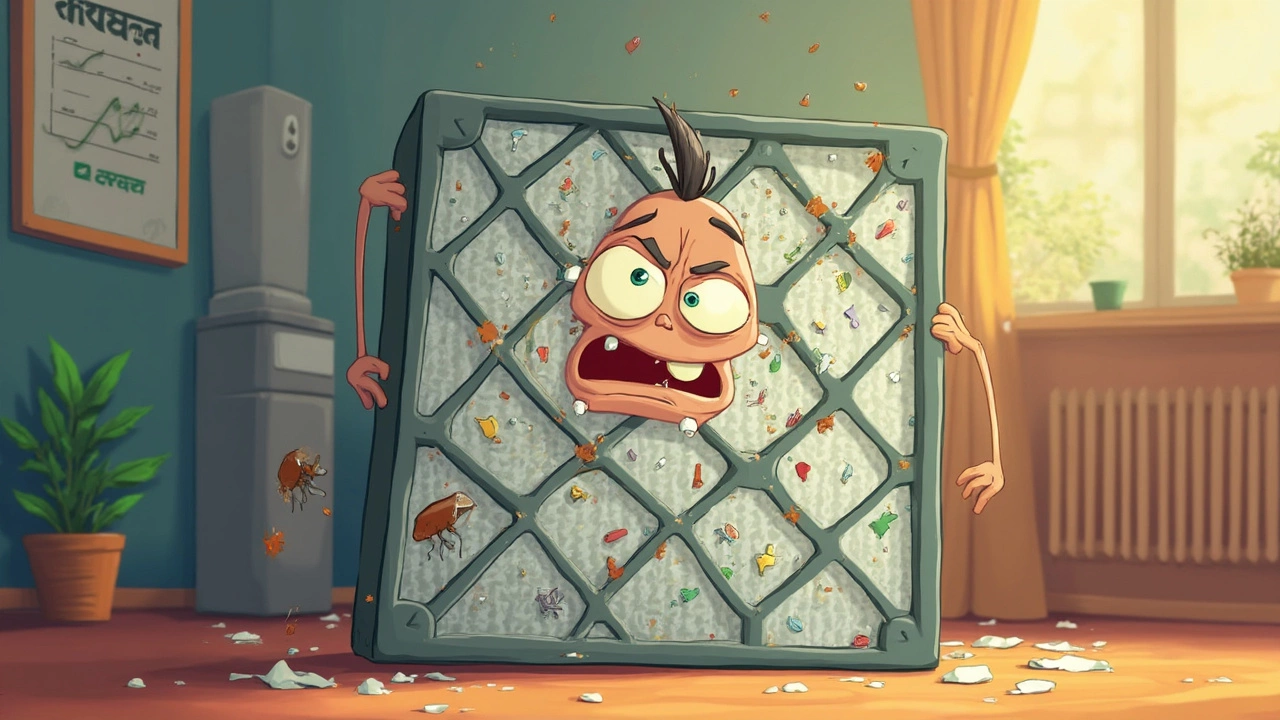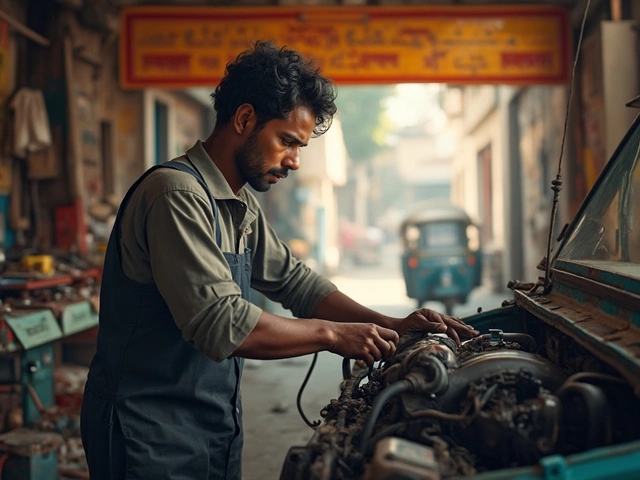So you've been putting off changing your air filter—a small task that seems easy to ignore. But hang on! Ignoring it might be causing more headaches than you think. That little piece of HVAC goodness isn't just catching dust bunnies. It's your home's first defense against grotty air invading your space. Let's chat about why swapping it out is kind of a big deal.
First off, a clogged up air filter can seriously mess with the air quality in your home. Think about all the dust and pollen floating around. Yuck, right? When your filter’s not pulling its weight, those particles zoom right back into your rooms, causing sneezes and wheezes. Time to give that filter some attention.
But it's not just about sneezes. When your filter’s dirty, your HVAC system must work harder—like, a lot harder. This turbo mode means more electricity use and, guess what, higher bills. Who's up for an unnecessary budget hike? Yeah, didn't think so. Save your wallet by keeping that filter clean.
- Why Air Filters Matter
- Signs Your Filter Needs Changing
- Impact on Air Quality
- Effects on Energy Efficiency
- Potential Health Risks
- Tips for Regular Maintenance
Why Air Filters Matter
You might think an air filter is just a piece of cardboard filled with fibers, right? But this little tool plays superhero in disguise for your home. A well-functioning air filter keeps dust, pollen, and other airborne annoyances at bay. Imagine it like a bouncer at a club, letting in only the good stuff and keeping out the riffraff.
First up, let's chat about indoor air quality. We spend about 90% of our time indoors, so the air quality in our homes is a big deal. A clean filter means cleaner air. When filters are clogged, they can't trap harmful particles effectively, which float around your home, waiting to be inhaled. Not exactly the fresh air vibes we're going for, right?
Your HVAC system also gets a break when the filter's doing its job efficiently. When the air filter is clean, the system doesn’t need to work overtime to push air through. This keeps your system running smoothly and helps extend its lifespan, saving you from costly repairs or replacements. Nobody likes surprise breakdowns.
There's another perk: energy efficiency. A dirty filter can increase your energy use by up to 15%, according to experts. Why pay more for electricity when swapping out a filter can keep that cash in your pocket? Plus, you’re helping the environment, and who doesn't want to do that?
And here's a bit of data to back it all up:
| Benefit | Impact |
|---|---|
| Improved Air Quality | Reduces allergens and pollutants |
| Enhanced HVAC Efficiency | Prolongs system lifespan |
| Energy Savings | Up to 15% less energy usage |
Understanding the importance of air filters highlights why regular checks and changes are essential. It's more than just maintenance—it's about ensuring you're breathing easy and living comfortably. So next time you're tempted to skip that filter change, remember the benefits. Your home and your health will thank you.
Impact on Air Quality
Ever noticed how you start sneezing more inside your house than outside? Yeah, your air filter might be having a bad day. When it clogs up, it stops trapping those pesky particles like dust mites, pollen, pet dander, and even mold spores. Without your filter playing defense, these nasties float around freely, having a mini party in your living space.
No one likes the idea of breathing in yesterday’s dust, right? A dirty filter can leave your home feeling stuffy and not-so-fresh. It also becomes a vehicle for bacteria and viruses to hitch a ride into your lungs. Not exactly the cozy home vibes you’re aiming for.
For folks with allergies or asthma, not changing out that filter can crank symptoms up to eleven. Instead of enjoying your chill time, you might be reaching for tissues or an inhaler. That’s no fun for anyone. Clean air equals easy breathing, which means it’s worth making filter changes a regular part of your routine.
Curious about just how much a grimy filter affects things? Check this out—homes with regularly swapped filters have particulate levels reduced by up to 60%. That’s a serious drop, making a noticeable difference if you’re sensitive to airborne particles.
Some might say that you can't see air, so it can't hurt you. Truth is, what’s invisible can pack a punch. Clear the air, literally, by keeping your air filters in top shape. You’ll thank yourself when you’re breathing easy without a hint of mustiness in the air.

Effects on Energy Efficiency
Picture this: your HVAC system is like a marathon runner. It needs to breathe easy to perform well. A clean air filter acts like fresh air on a cool day, but a clogged one? It's like running with a sack of potatoes on your back. Not fun.
When the air filter gets dirty, the system has to hustle harder to push air through. This extra effort can hike up your energy use by as much as 15%—and that's not just pennies we're talking about. Over time, keeping a dirty filter is like tossing money out the window every month.
Here's the kicker: when your HVAC system works overtime, it doesn't just cost more; it wears out quicker. That means you're looking at more repairs and a system that might kick the bucket sooner than you'd like. So, those air filters do more than keep the air clean. They're crucial for maintaining energy efficiency and prolonging your system's life.
It's simple math, really. By swapping out your air filter every 1 to 3 months—depending on your system and filter type—you can keep your energy bills in check and extend the life of your HVAC. Who wouldn't want that?
Next time you're about to look the other way on those dusty filters, remember: spending a little time now can save a lot of cash and hassle later.
Potential Health Risks
You might not realize it, but holding off on changing that air filter can be a total nightmare for your health. It's not just about a little sneezing here and there—it can bring around a bunch of unwanted issues.
First, think about those airborne allergens like dust mites and pollen. They're just waiting to sneak past a filthy filter. Breathing in all this stuff can worsen allergies or even trigger asthma attacks, especially for those who are already sensitive. Imagine having your own home turn into an allergy hotspot—no thanks!
But it doesn't stop at sneezes. A clogged filter might be letting in mold spores too. Yikes! Breathing in mold can lead to respiratory issues, and let’s face it, who wants to mess around with those nasty health problems?
It can also invite bacteria and viruses to linger longer than they should. If someone in your home is sick, a dirty filter can slow down recovery by spreading those germs all over again. Not the vibe anyone's going for.
It's not only immediate issues that are a worry. Long-term exposure to poor indoor air quality can lead to fatigue, headaches, and even more serious conditions like chronic respiratory diseases. Keeping the air fresh means lowering those risks for you and your family.
So, what’s the best move? Keep that air filter in check. Regularly changing it out means you’re not only protecting your HVAC system but also making sure everyone at home stays healthy and breathing easy.

Tips for Regular Maintenance
Keeping up with air filter maintenance might seem like one more thing on the to-do list, but it's worth every bit of effort. A smidgen of time spent now can save you loads of hassle and cash later. Here's how you can keep your filters in tip-top shape.
First, let's talk about the frequency. Wondering how often to swap them out? A good rule of thumb is every 3 months for basic filters. But if you've got allergies, pets, or live in a more polluted area, you might be in for every 1-2 months.
Before chucking out your old filter, always check the size. Filters come in different shapes and sizes, and finding the right fit is crucial. Measure your old filter to avoid any surprises at the store.
- Check Once a Month: Even if you're not replacing it every month, a quick check won't hurt. You'll spot any damage, dirt buildup, and you'll be able to gauge if a swap is necessary sooner than planned.
- Choose the Right Filter: Understanding MERV ratings on filters can make a difference. The higher the MERV rating, the better the filter can trap small particles. But remember, a higher rating can stress your HVAC system if it's not built for it.
- Set a Reminder: Okay, life gets busy, and remembering the filter doesn't top anyone's list of fun things. Use an app or a simple sticky note on the calendar to remind you when it's time to check or change the filter.
Jeffrey H. Timpani, a renowned HVAC specialist, says,
"A well-maintained air filter not only helps in keeping the air quality in check but also ensures your HVAC system operates smoothly—saving energy and reducing wear and tear."
For the tech-savvy, consider smart air quality monitors that give real-time updates and reminders when it's time to switch out your home filter.
Remember, the minute it takes to change your air filter can save hours of dealing with a cranky HVAC down the line. A bit of vigilance can really payoff, keeping your indoor space comfy and fresh.




